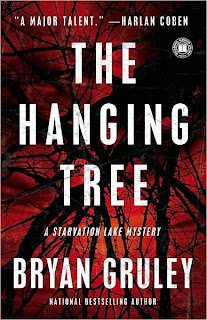As The Hanging Tree, book two in Bryan Gruley’s Starvation Lake series, opens, not much has changed for small town reporter Gus Carpenter. He is still reporting local politics, sports and deaths for his twice-a-week newspaper and playing in a midnight hockey league at the local rink. When, in book one of the series, he returned to Starvation Lake after disgracing himself in Detroit, Gus moved in with his mother - he still lives there. And to complete the circle of his life, Gus is romantically involved again with Darlene, a woman he has loved since they both were children and she was his cousin Gracie’s best friend.
Gus Carpenter might work for a smalltime newspaper in remote northern Michigan, but he still considers himself a good investigative journalist. Sensing that something is not right about the new hockey rink being donated to Starvation Lake, he decides to look into the donor’s finances. In the process, he manages to infuriate the millionaire benefactor and most of the paper’s readers and advertisers. That is enough to make his life in hockey-crazy Starvation Lake miserable, but when his cousin is found hanging from the town’s “shoe tree,” an apparent suicide, things will get much worse for Gus.
His instincts tell him that Gracie’s death is a case of murder, not suicide, and Gus vows to learn the truth about what happened on the night she died. His investigation brings him back to Detroit where he digs into the life Gracie lived in the city before she returned to Starvation Lake only to be seen there, by those who thought they knew her best, as little more than a failure and a drunk.
Because The Hanging Tree is a character-driven story with an intricate backstory, readers who begin the Starvation Lake series here will not short-change themselves. The book is filled with well developed, but less than perfect, characters that move the story along at a nice pace but Gruley offers more. Along the way, he gives his readers a taste of what life might be like in those little towns up north where men in their thirties and forties schedule their lives around the games they play in midnight hockey leagues. Even non-hockey fans (like me) will appreciate Gruley’s game descriptions and insights into the minds of men willing to risk major injury on the ice at the advanced age of 40 or so.
My only quarrel with the book is its ending, a solution to its central mystery I found to be more confusing than convincing. Perhaps, female readers will better understand the ending, but it did not work well for me.
Rated at: 4.0
(Review Copy provided by Publisher)


No comments:
Post a Comment
I always love hearing from you guys...that's what keeps me book-blogging. Thanks for stopping by.